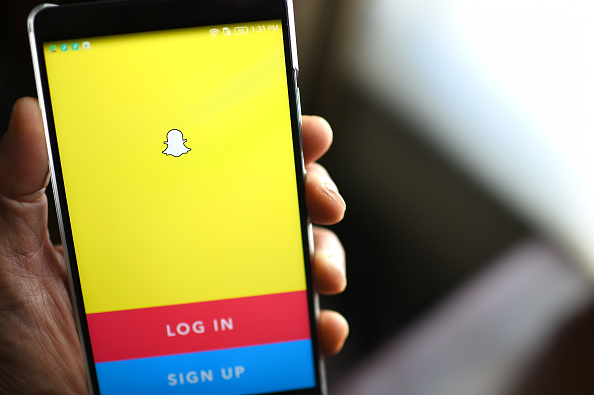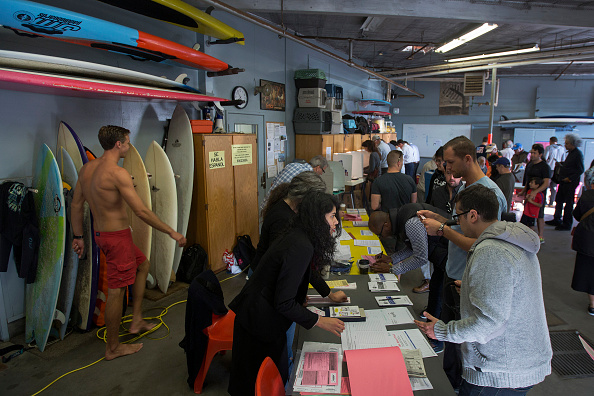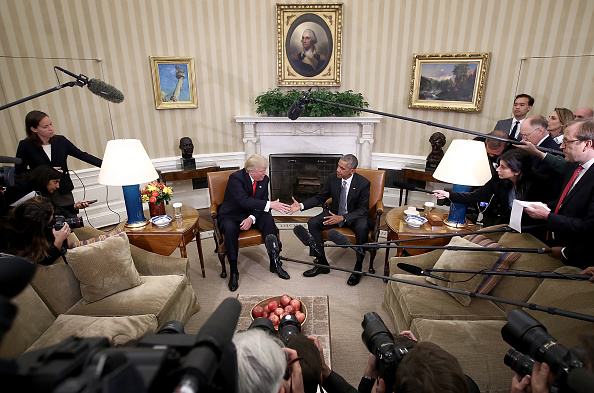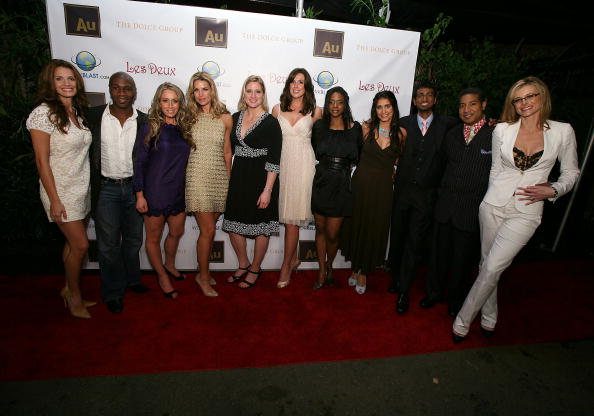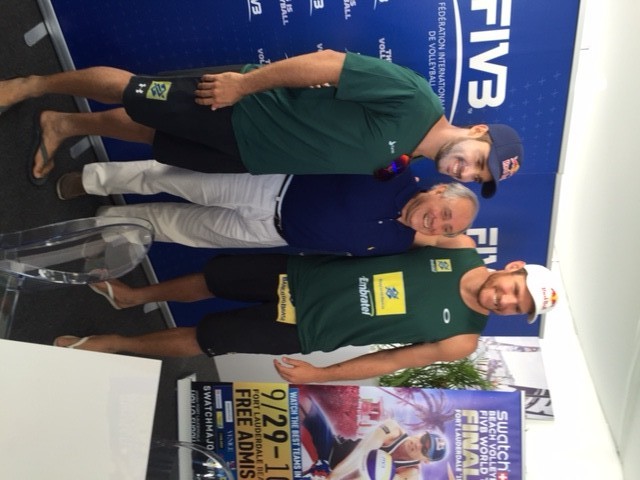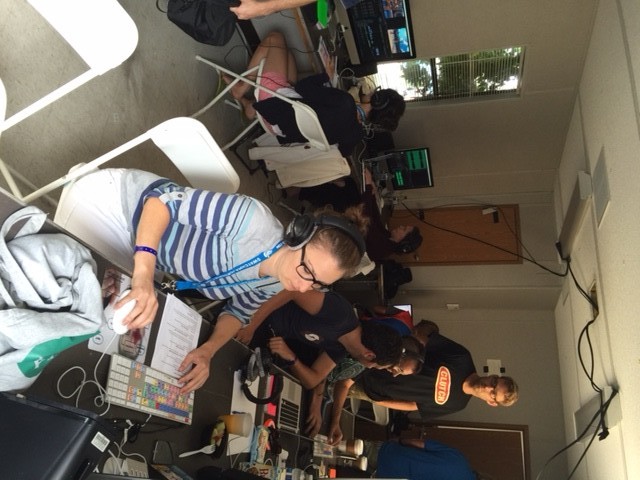Snap Inc., the Venice, California-based parent company of Snapchat, went public Thursday. It’s now worth $34 billion.
As the Washington Post pointed out, that’s more than Macy’s and American Airlines. The New York Times noted that $34 billion is more than “the old-line media company CBS,” and about three times the value of the social-media presence that is Twitter.
What does this have to do with the Olympics?
Everything.
Snapchat, for the unfamiliar, is the mobile app that allows you to send pictures and videos that, after a few seconds, self-destruct. Once you learn the basics, you can add filters, everything from rabbit ears to dog noses to whatever. You can also add tags that show where in the world you are.
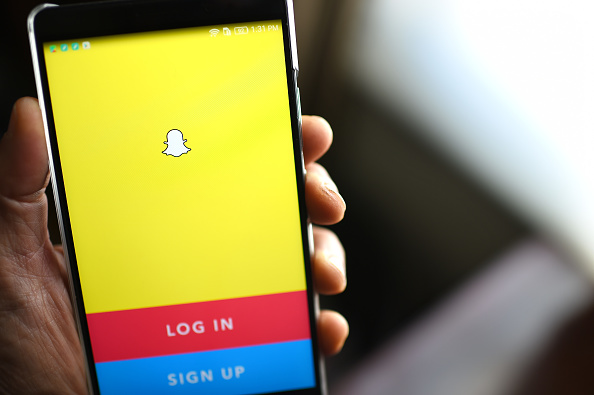
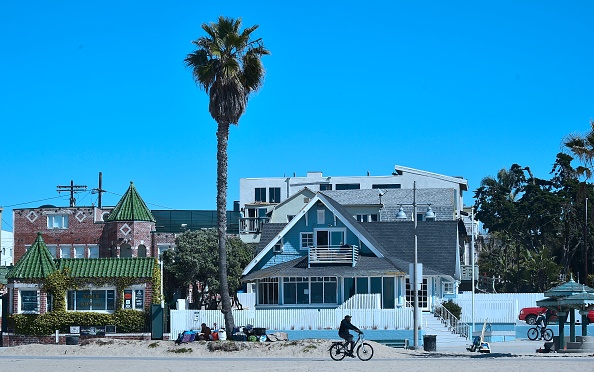
Grown-ups go — what’s the big deal? Teens go — awesome, mom and dad can’t figure it out.
Snapchat is actually way more. There’s another part to the app, and its NFL content during the recently concluded season drew 42 million unique viewers. Translation: a lot of people. Snapchat literally has changed the way people shoot pictures — as Ad Age pointed out, brands and publishers wanted to reach that sort of massive audience, which in turn meant shooting vertically instead of horizontally for video on mobile phones.
When it comes to Snapchat and social media, the signals of change are all around us. But most grown-ups within the Olympic scene — the International Olympic Committee in particular — have proven way too slow on the pickup.
The ongoing campaign for the 2024 Summer Games, down now to just two candidates, Paris and Los Angeles (see above, Venice, California), is in every way the very first real social-media bid race.
Snap is now worth crazy money. Twitter is the essential news feed. There are roughly 7 billion people on Planet Earth, and Facebook had 1.86 billion monthly active users as of the fourth quarter of 2016. Let’s not forget the pretty pictures on Instagram, the recipes on Pinterest and on and on.
What does this mean?
For a global enterprise such as the Olympics, there assuredly are positives to the way social media can crush time and space. But as the 2024 bid campaign has made abundantly plain, there are negatives, too, with which the Olympic movement must reckon.
Instead of doing so, it is instead facing grave risk.
And its most senior officials barely comprehend what is it at issue.
This is not hyperbole.
Paris is very fond of its bid slogan: “Made for Sharing.” It is super-clear that bid and government officials think it’s super-positive. But history shows that construction and infrastructure costs inevitably skyrocket. What happens when concern over such costs reaches a trigger point? Cue — on social media — outrage, grievance, agitation. What if “Made for Sharing” flips into a negative, and quickly?
Never have the Games been awarded in an era when social media has shown how easy it can be to amplify such grievance and conflict.
See two of the other cities that started this 2024 race: Budapest and Hamburg, Germany.
Both are now out because of social media and, in Hamburg’s case, an attendant referendum, in the case of Budapest, the threat of one.
The warning signs are all blinking red for Paris, too.
To be blunt: the IOC does not fully appreciate this.
Nor does it understand the essentials: how itself to use the power and reach of social media and, on the other hand, how to help those within its orbit blunt or confront social media when employed as an attack on the Olympic movement.
You see this in so many ways.
The IOC’s most important communications outreach remains stuck in 1982 if not before: a beautifully designed and elegantly produced quarterly coffee table-style magazine called Olympic Review.
The IOC says it wants to reach the kids. The kids are glued to their phones. And the IOC puts out a magazine that arrives by snail mail every three months, and then only to a selected mailing list.
Wait, counters the IOC: we have 4.9 million Twitter followers.
That’s not anywhere near top 100 in the world.
The Barcelona soccer team has 20 million. Real Madrid, 22.3 million. LeBron James, the basketball star, has 34.3 million. The soccer star Cristiano Ronaldo, nearly 50.2 million.
Top 10 starts with Justin Timberlake (58.1 million) and goes up to Justin Bieber (No. 2, 91.9 million) and Katy Perry (No.1, 96 million).
Katy Perry says on her bio, “Artist. Activist. Conscious.”
The Olympic values: “Respect. Excellence. Friendship.”
Why is she so big and the IOC so — not?
The Olympic charter is, essentially, a rough facsimile of one of the American organic documents, the Declaration of Independence.
What makes the Olympic movement different from for-profit sports entities is the values at the core of the charter. Those are democratic values — democratic with a little d.
Right now, again no exaggeration, all this is at risk.
The proof is in the races for the 2022 and 2024 Games.
For 2022, five cities in western Europe dropped out of the running, put off by the costs of an Olympics, in particular the $51 billion figure associated with the 2014 Sochi Games.That left the IOC to choose between Beijing and Almaty, Kazakhstan.
The members chose Beijing, site of the 2008 Summer Games, by four votes. The Chinese figure to keep infrastructure outlay down by not including however many billions it’s going to cost to build a high-speed rail line up to the mountains — where there’s no snow.
If you take away a fair accounting of what's what and the humanistic ideals that underpin this entire Olympic thing, you very quickly have to ask what this is all about— and, of course, if this Olympic thing isn't really dealing from a position of weakness.
It’s entirely reasonable to ask what position the IOC is in now.
Two surviving bids. (2024, 2022)
"Choosing" between a totalitarian or autocratic regime. (2022)
In December 2014, the IOC, urged by president Thomas Bach, passed a 40-point purported reform plan dubbed Agenda 2020. Virtually nobody believes that any of the reforms, particularly as they relate to Olympic bids, are meaningful. Why? Because there’’s no factual evidence any of them are real.
Instead, what we have is blather and puffery.
The Rio 2016 Games were nothing less than an organizational and financial calamity. Yet the IOC, in December, called them the “most perfect imperfect Games.”
This sort of thing is why, even before Rio but amid the 2022 campaign implosions, the locals in Boston said no — social-media agitation playing a key role. The U.S. Olympic Committee made the dumb choice early on to go to Boston before reversing course and heading to LA.
Boston’s no-Games activists took their social-media expertise to Germany. A 2015 referendum there sank the Hamburg bid.
It can hardly be coincidental that over time the results of these referendums are, for the IOC, getting worse. A vote four years ago in St. Moritz — in Switzerland, of all places, the IOC’s longtime base — asked voters if they wanted 2022. No, by 53 percent. They tried again last month, again in St. Moritz, for the 2026 Games. No, by 60 percent.
Rome pulled out last fall for different reasons: the mayor said the city had better things to spend money on than the Olympics.
Who, on January 1 of this year, thought a Budapest referendum might be in the offing?
Now the Budapest bid is dead. Layers of government had spent years putting together investment, strategy and branding. It all blew up that quick.
A campaign stitched together by local organizers, Momentum Mozgalom, in a matter of weeks — weeks! — managed to collect 266,151 signatures in favor of holding a referendum on the bid.
Blather:
“It is disappointing that this [Budapest] decision had to be taken — the candidature committee had presented an excellent project, which was built on the reforms contained in Olympic Agenda 2020,” IOC spokesman Mark Adams said, and poor Mark Adams, because if the “reforms” were truly meaningful and the bid truly was so “excellent” it’s hard to see how 266,151 people thought maybe they ought to have a vote on that, and nonetheless he has to get up and say this sort of stuff.
So what is the lesson of Boston, Hamburg, Budapest and, perhaps, Paris?
It’s not who is president of the United States or France or wherever. Donald Trump, whatever. Marine le Pen, François Fillon, Emmanuel Macron, Benoit Hamon, whoever.
Presidential politics matters, but not now in the way most in the media are trying to wrap their minds around. That was then, so 2007, and this is now:
The real threat to the Paris bid — and it is potentially lethal — is social media and the possibility if not probability of a follow-on referendum.
That threat is immediate. It is, too, this spring and summer. It is even after September 13, the day the IOC is due to meet in Lima, Peru, to decide the 2024 winner.
To explain:
In 2017, the ability to communicate directly via social media— and, critically, to organize — is more ready than at any time in human history. See Trump’s presidential campaign. See the so-called women’s marches upon the Trump inauguration. See any number of other examples.
Practically, what this means — for the Olympic scene — is this logic tree:
1. Any democratic society that has a 2. government-run Olympic bid and/or organizing committee but at the same time 3. community activists who 4. are fired up over something, whatever that may be 5. with unfettered access to the internet 6. will inevitably, and probably sooner than later, figure out that they can leverage that activism and gain not just political notoriety but power through social media by seeking a referendum on the Olympic project. Consequently, 7. the referendum absolutely, positively will significantly threaten if not sink the project.
This sound overly dramatic?
It’s not.
This is what the IOC needs, and now, to take stock of.
Social media is not just Katy Perry or Justin Bieber’s marketing fun. It is a tool for political activism and organization. If people sniff out a con or a problem — even if it is not true — it can, and will, explode. If there is concern or anxiety, it can — and will — explode.
Hungary, a democratic parliamentary republic since just 1989: 266,151 signatures on a Budapest 2024 referendum in a matter of weeks.
Just imagine what could be done in France, where democracy has been in action for considerably many more years. That is a powder keg waiting for the spark.
Maybe it’s already lit. Activists say they have collected 5,000 signatures toward a referendum.
The Paris 2024 argument can essentially be boiled down to two factors: One, we’re Paris. Two, it’s 100 years since we held the 1924 Games.
To be clear, there has never been a legitimate poll in Paris assessing public support for the 2024 project.
Let’s say a poll comes out and the yes numbers are at 60. A no campaign that starts looking up only at 10 points — that, given social media, would be so easy to wipe out. The bid would essentially be DOA.
Let’s say further that the IOC were to foolishly opt for sentiment instead of common sense. Even so, the risk to the Paris project extends beyond September 13.
By no means would an IOC vote for Paris in any way stop the prospect of a referendum. Has the IOC even paused for a moment to consider this notion?
Over seven years, the time from awarding a Games to opening ceremony, governments change. If a referendum passes, what is the IOC going to do — go where it’s not wanted? Sue? Oh, sure — litigate (in some forum) and then force the French government to pay, because that is just the thing to make other governments want to take on a Games down the line.
By contrast: LA.
The difference between LA and Paris is as obvious as it is critical.
Paris for 2024 is a government-run enterprise. To reiterate the point made in this space over the past several weeks, recent editions of government-run Olympics have been bloated, and that is why taxpayers are mad as hell and that is why in the west they are both turning on the IOC and turning to social media to agitate: Sochi $51 billion, Beijing 2008 ($40 billion), Rio 2016 (projected $20 billion), Tokyo 2020 (now looking at $25-30 billion when the bid promised $7.8 billion). Given this record, there is no reason to expect anything but the same from Paris.
Los Angeles, the bid and, if it wins, the organizing committee, is privately funded. (Just as in 1984, which produced a $232.5 million surplus.)
What that means: a privately run LA 2024 project is, for the most part, out of the reach of government.
This is why surveys consistently have shown incredible taxpayer support for LA 2024 — 80 percent and higher.
In any democracy, there are always some people who don’t like something. That’s just life.
But if you wanted to start a referendum against LA 2024, it wouldn’t make any sense.
That would be like voting on whether you want the neighborhood grocery store run by Cousin Marvin to be open or closed. What? He’s a private business, just like Mrs. Anderson's bakery down the street. Leave him alone. And her, too.
Beyond which, mindful both of 1984 and of the Boston experience, the LA 2024 people at the outset went around town to hold 30 community meetings — not only to gauge but to build community support.
Did Paris have community meetings in every arrondissement? Hmm. Here is Danielle Simonnet, a Paris councillor for the city’s 20th arrondissement, telling Le Monde in its February 23 editions, “Of course we need a referendum,” later in the story calling Games costs “enormous,” adding, “The bill is going to be salty.”
Also, and this is just common sense talking along with some 30 years of journalism experience, if the LA plan was dicey or not well-cooked, and there needed to be a journalist to expose it, you can believe that journalist would already have found someone in that LA 2024 bid team. Or some soul within the bid team would have reached out to the journalist.
That has not happened, is very unlikely to happen, in Los Angeles.
Because, one, of that neighborhood reach-out in LA and, two, the LA plan is solid and privately funded. Example: the original thinking was, let’s build an expensive athletes’ village downtown. The bid team thought it through and shifted course, to the already-existing dorms at UCLA.
The Paris plan, again to contrast, calls for building a hugely expensive village in what is now a violence-marked banlieue called Seine-Saint Denis.
Wait until someone on the ground in Paris or elsewhere in France, angry about something, figures that out.
That’s what referendums are for: made for sharing, indeed.


